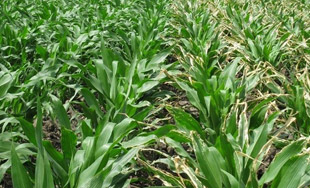
 Soil pH is really an indicator of your soil's ability to use fertilizer. Here are a couple of examples of the importance of understanding the pH of your soil.
Soil pH is really an indicator of your soil's ability to use fertilizer. Here are a couple of examples of the importance of understanding the pH of your soil.
Low pH (high acid): Acid in the soil tends to reduce the number of microbes in the soil—and it's the microbes that convert fertilizer into food plants can use. Fewer microbes means you run the risk of overfeeding the soil—and having a large percentage of your fertilizer do you no good at all.
High pH (high calcium): Under high pH conditions, adequate phosphorus may be indicated on the soil test, but it probably isn't available to the plant because it's tied up in the soil. You think you have enough P, but your plants know better. You just won't find out until it's too late.